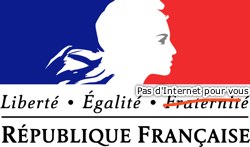
Bob Ostertag is a musician and experimental audio artist based in San Francisco. He has been performing and recording since the 1970s. In October of 2007, I interviewed him about the release of his new album, w00t, a collage of computer game sound and image that began as the sound for Special Forces, a live cinema piece by Living Cinema (Pierre Hébert and Bob Ostertag). Bob is one of a growing number of musicians who have decided to release their music for free Internet download. Even within this group, Bob is unusually progressive — or as I prefer to think of it, ahead of the curve: he chose a Creative Commons Attribution 3.0 license, which allows not only downloading at no charge, but the freedom to make derivative works and to make commercial use of the music, for example as the sound for a live performance for which tickets are sold.
In October 2007, I conducted the following interview with Bob about the album’s release. (Note: between our previous article by him and now, Bob joined the board of directors of QuestionCopyright.org).
Karl: First of all, what’s the name of the album?
Bob: “w00t” [spells it out]
Karl: So were you yourself a devotée of the video games whose sounds w00t draws on?
Bob: Did I play the games?
Karl: Yeah.
Bob: No, no… I’m reluctant to admit that…
Karl: [laughs] Too late, it’s all part of the public record, it’s the front page of the New York Times tomorrow: “Bob Ostertag: I Never Played The Game”.
Bob: Yeah, me and JT Leroy, it’s all a hoax! Uh, no. But I’m very interested in the gaming phenomenon. My partner in this, John Cooney, actually designs games, and if you go to his website you’ll see that he puts up free, online Flash games, for which he’s very well known.
Karl: Do you happen to know if that’s “free” as in “all uses allowed”?
Bob: Yeah, you just play them online, and they’re fantastic, he’s been listed in many places. They’ve actually gotten very popular. He’s actually a former student of mine, the one I mentioned in my earlier article at QuestionCopyright.org, the one who got the cease-and-desist letters from corporate lawyers.
Karl: So there are two sort of copyright-related things going on here. One is that you use a lot of other people’s material, and two is that you decided to make the result of that use available itself under an open license, regardless of the license of the original material.
Bob: Yes, well, I wouldn’t say that my decision to put this under an open license is related to the fact that I make use of others’ material, because I put all my work under that license, whether I use others’ material or not. So the fact that I use a license that allows people share and download and copy is sort of a separate issue. Obviously, though, the fact that I decided to use terms which are pretty minimal also creates ideal terms for allowing works like this one.
Karl: It certainly frees you at the outset from any charge of hypocrisy. I mean, anyone could take this album and starting using it in their own mix.
Bob: And I would say that computer games absolutely pervade our culture, I mean, we’re really living a computer game, we’re all doing this on a daily basis.
Karl: …yeah, some of them just happen to have real missiles attached…
Bob: Yes. And particularly gamers, you know, every gamer lives in a collage of computer games right now…
Karl: By that do you mean that they just have a large set of games, or that the games themselves are composed of references to games that came before?
Bob: By that I mean that I think their life experience right now and their experience of games are pretty close to a collage. A real gamer doesn’t play just one game, they’re involved pretty deeply, actually, in a variety of games. A lot of gamers put so many hours into gaming, that the visual and audio landscapes of the games become part of their lived experience. So that’s what I mean. I don’t mean that the games themselves are collages of elements from other games, but I mean that if you’re a gamer, if you’re an avid gamer, the way you experience the world of games is pretty close to a collage already.
Karl:Yeah, I mean, I don’t play a lot of the games myself, but I talk to a lot of people who spend a fair amount of time gaming either on their own home console or they’re sort of taking part in virtual reality worlds that are games but also they’re places that you live, that become your mental space. Is the album sort of an attempt to make that mental space external, to express it artistically, and make it apparent to other people who don’t play these games?
Bob: Sure, that’s a fair description.
Karl: Have you ever done music for a game yourself, like been hired by the game company?
Bob: I have, yes. A long time ago, a long time ago. I mean it was trivial; I didn’t actually write anything, I just did the sound effects.
Karl: Was it satisfying artistically, or was just completely like, you know…
Bob: Yeah, it was a day job.
Karl: “I was young, I needed the money”, that kind of thing?
Bob: Exactly. Well, I wasn’t so young, but I did need the money.
Karl: [laughs] Would you say that your conception of what the album is is the same as your collaborator’s, or is he sort living in a different universe?
Bob: Oh I think pretty much the same. But you should ask him!
Karl: I’d like to. Is his email address in the email you sent me?
Bob: Yes, or you can contact him through his website.
Karl: Maybe what I’ll do is I’ll just send him a transcript of this and then he can just add comments, and then we can just post that. [We’ll invite John Cooney to comment. -KF]
Bob: Sure.
Karl: I think this is the first release you’ve done that is under a completely free license…
Bob: Yes.
Karl: …the previous ones were Creative Commons licenses, and I think they allowed derivative works but they didn’t allow commercial redistribution, is that correct?
Bob: Correct, correct. Also, all those previous ones had a prior life, they were first published in the traditional way, and then later I put them online for free download.
Karl: Are you going to have a printed CD with your own booklet and stuff?
Bob: No.
Karl: Oh! Okay, so I just download it, burn a CD, print the liner notes, put it in my own jewel case.
Bob: Yup. Or you just download it and put it in your own iTunes, or wherever you put your music. And the file that you download, if you put it into iTunes, it’ll actually display the artwork in the way that iTunes displays cover art, the same as if it were released commercially.
Karl: What made you take the jump from… I mean, using the previous licenses is a little bit more than testing the waters, it’s actually going pretty far, but this is really diving in. In terms of changing the terms to be, basically, anyone can do whatever they want with it, as long as they credit you.
Bob: Really, for my own terms, I’d pretty much just put it in the public domain. Because in a sense I feel like using these Creative Commons licenses perpetuates the myth that somebody might actually be able to enforce the terms that they’d like, which is actually not true.
Karl: Hmmm, that’s an interesting statement…
Bob: If somebody uses it and doesn’t credit myself or John, I have no recourse. I’m not going to, uh, hire a lawyer, I mean that’s just a myth. So in a sense, if I had my druthers I’d just put it in the public domain. But on the other hand, I support of the efforts of the Creative Commons, I want to be part of that overall effort. So even though by using the creative commons license I’m technically claiming rights which I have no means to enforce, and couldn’t enforce if I wanted to, I still want to be part of that, I want to support them.
Karl: You know, one thing that occurs to me is that, if by some chance somebody did use the stuff and pretend it was theirs, and not credit you, even though you might not hire a lawyer, you could make public stink about it, and in that case having the Creative Commons attribution license on sort of helps your cause.
Bob: But I could do that anyway.
Karl: Yeah, you could do it even if it were in the public domain. It just becomes a little bit easier.
Bob: The point is to make a moral claim. Having the license on doesn’t show how it got there, it would just be a matter of principle. But I could show that I had this thing up on the web at a certain date, then that would show that people that we did it.
Karl: Yeah, I don’t think it would make a legal difference. So do you think you might move to public domain for later works, or do you want to sort of stick with giving Creative Commons a public nod like that?
Bob: Oh, I think I’m comfortable with Creative Commons attribution license.
Karl: Last week Radiohead released their new recording, In Rainbows, for free Internet release. Do you see yourself as working in the same direction?
Bob: Well, no. Which is not to criticize Radiohead. I support any move towards free culture, particularly in terms of the Internet. But there are important differences between what they are doing and what I am doing here.
w00t is not available on the Internet for a limited time only. It is a free release. And w00t is not a one-time experiment. I have put all my music up for free download. Radiohead has made clear that intention is not to give away its music, but rather to “prevent it from leaking out to the public haphazardly over several months before the official CD release.” And that release will be a box set priced at $80! Whether this ultimately plays out as a move towards freer culture or a convoluted marketing ploy will have to be seen.







